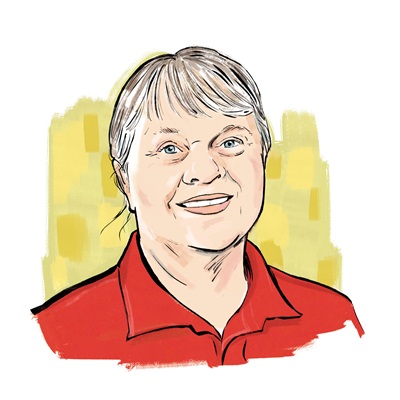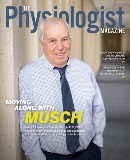The Making of an Educator
By Barbara E. Goodman, PhD, FAPS

I was a classically trained PhD student in the 1970s. As a graduate student in physiology at the University of Minnesota, I was required to be a teaching assistant for three out of every four quarters during my five years. I completed a six-year postdoctoral research experience at UCLA, where I voluntarily taught in medical student laboratories and as an adjunct professor in the nursing program. When I began my academic position here at the University of South Dakota (USD) in 1986 as a respiratory membrane transport physiologist with my own laboratory, I taught general and membrane transport physiology to the medical students.
Despite consistent assignments and requirements to teach, none of my early experiences involved any educational classes or special training in teaching. In 1990, I became involved in APS education initiatives, first as one of the inaugural research hosts for APS’ first class of high school summer research teachers. I also supported APS K–12 initiatives by writing small grants and curricula for local outreach teams, leading training for K–12 teachers throughout South Dakota and in Montana reservation communities, and serving as a physiologist-in-residence at four APS Science Teaching Forums. In 2000, I volunteered to be the scientist-in-residence for our school district to facilitate bringing university experts into the classrooms.
“Before my involvement with the APS summer research teacher programs, I barely knew what ‘pedagogy’ meant.”
Thus, I was thrilled to participate in APS’ Physiology Understanding (PhUn) Week when it began in 2005. I conducted physiological activities and experiments in seventh grade classrooms and helped my advanced human physiology undergraduate students design and teach renal physiology modules to high school students. I also served as a member and chair of the APS Education Committee and as a member and chair of the APS Communications Committee, which worked to help scientists better communicate with non-scientists. These experiences have all helped me hone my professional and mentoring skills.
Before my involvement with the APS summer research teacher programs, I barely knew what “pedagogy” meant. I learned from the K–12 teachers and APS activities how to be a better educator. I also learned how to explain physiological principles to non-scientists and help them understand what is known and what still needs to be investigated.
PhUn Week taught me how to be creative in teaching physiology to middle school students and spark their love for the discipline. It was great to see my seventh graders again when they were in the high school anatomy and physiology class and then when some of them became undergraduates at USD.
I have grown dramatically as a science communicator and educator by interacting with students from age three to high school and with their teachers. The wide variety of physiology teaching opportunities have brought a different depth and dimension to how I teach my undergraduate and graduate students. They have transformed how I teach advanced human physiology to undergraduate pre-professional students, helping me apply numerous student-centered learning opportunities in renal, respiratory, cardiovascular, neuromuscular, endocrine and gastrointestinal systems.
If you and your trainees want to improve your science communication skills, I recommend visiting a second grade classroom to explain how the heart works!
Barbara E. Goodman, PhD, FAPS, is professor in the Division of Basic Biomedical Sciences of Sanford School of Medicine of the University of South Dakota in Vermillion. She has been an APS member since 1979 and is editor-in-chief of Advances in Physiology Education.
This article was originally published in the May 2022 issue of The Physiologist Magazine.
The Physiologist Magazine
Read the Latest Issue
Don’t miss out on the latest topics in science and research.
View the Issue Archive
Catch up on all the issues of The Physiologist Magazine.
Contact Us
For questions, comments or to share your story ideas, email us or call 301.634.7314.


